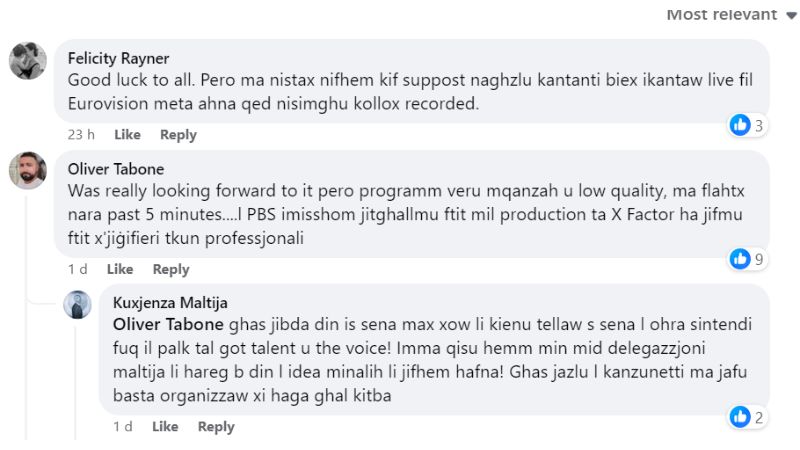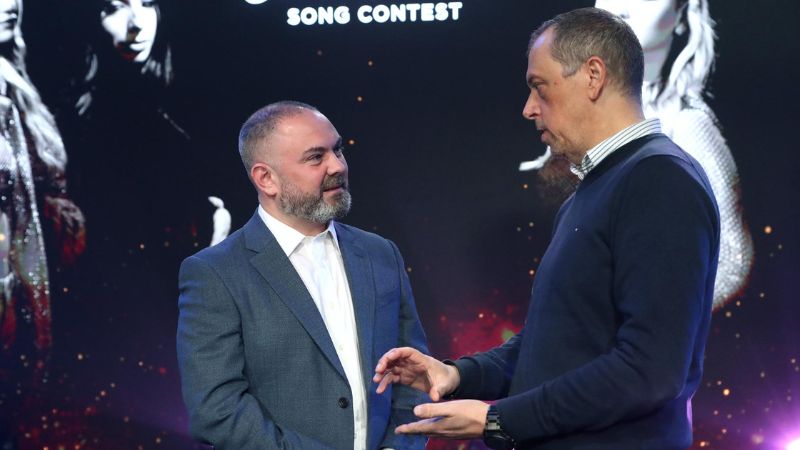PBS, the State company in charge of public broadcaster TVM, is facing criticism over the handling of this year’s Eurovision Song Contest, in particular, a decision to block the participation of live audiences.
Previous editions were held in venues such as the Mediterranean Conference Centre or Ta’ Qali’s Malta Fairs and Conventions Centre (MFCC), allowing thousands of followers to be present and participate in the show.
This year, the station opted for a simple studio-based festival without the participation of an audience.
Also, instead of performing live, participants are miming a pre-recorded backing track with vocals.
This year’s format has not gone well with Eurovision fans, many of whom have taken to social media to express their displeasure and to levy criticism at PBS.
Referring to organisers as “amateurs” who are “incapable of organising a decent show”, they asked for explanations on why the state broadcaster has “taken the festival decades backwards” to the 1970s when it was organised in a similar studio format.
Comparing this year’s shows to past editions held outside the studios, many described it as limited, poor, boring, unprofessional, and failing to create enthusiasm.

A few of the negative comments about the PBS show.
It doesn’t come cheap
But the studio set-up and disgruntled fans are not Eurovision’s only problem this year.
Sources told The Shift that PBS Executive Chairman Mark Sammut decided to refurbish an old studio for the occasion.
They said this cost taxpayers some €1.6 million in direct orders, including state-of-the-art audiovisual equipment which PBS staff are not trained to use.
This comes alongside the decision not to include audiences who paid for their tickets in previous editions, generating revenue for the already cash-strapped broadcaster. The show loses a significant chunk of potential revenue by refusing an audience.

PBS Minister Owen Bonnici discussing the song festival with PBS Chairman Mark Sammut.
The Shift contacted Sammut to ask who decided the festival format and whether the PBS board of directors was involved in this decision, but he did not reply.
The Shift also asked Sammut to specify how much money PBS spent on refurbishing the unused studio, how the equipment was procured, from whom, and whether tenders were issued as required by public procurement rules.
But again, no answers were forthcoming.
With Sammut at the helm, PBS is losing millions of euro a year despite some €6 million in state subsidies and lucrative advertising from government ministries and agencies.
Sammut was chosen to head PBS by Prime Minister Robert Abela despite being an IT specialist with no experience in the media. He receives a double salary, both as chairman and as CEO.
At the same time, through his private IT businesses, Sammut is also getting direct orders from government departments.













Everyone is entitled to his opinion..
Not to mention that the expert jury were either Arts Council staff or people who work with Sammut’s wife or even a nephew of the Sammuts
There’s a lot to be unravelled about this event. Starting off with the systematic exclusion of foreign talent. Can this event be audited in terms of spend and the voting system? Smells like friends of friends of powerful friends. Wherever there’s smoke there’s usually a fire.